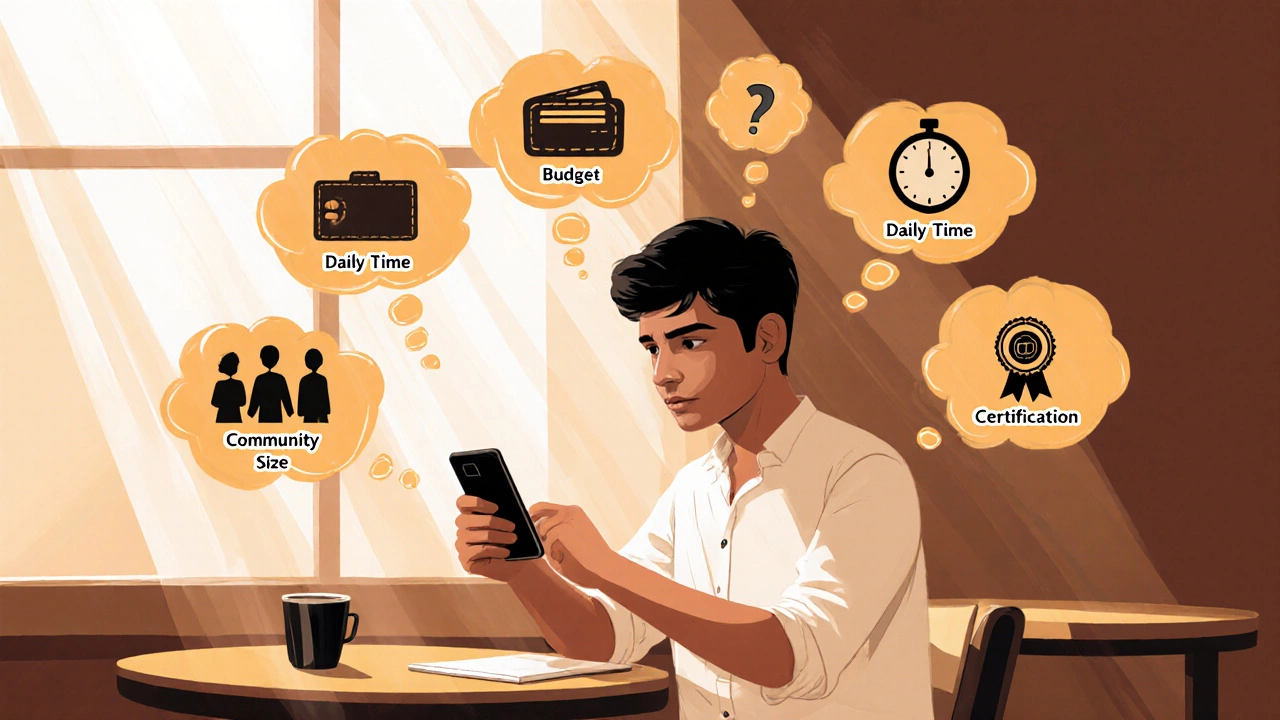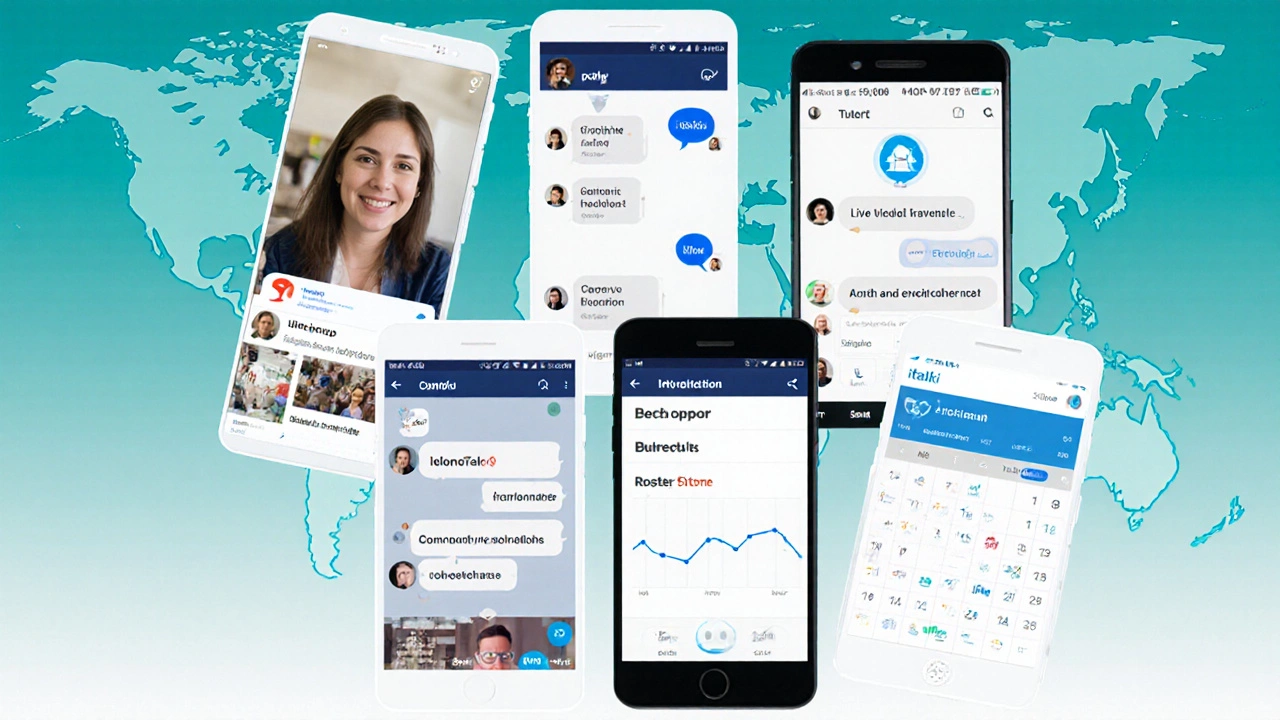Top English Speaking Practice Apps in 2025 - Find the Best One
 Oct, 11 2025
Oct, 11 2025
English Speaking App Finder
Answer these questions to get personalized recommendations based on your needs:
Your Recommendation
Key Takeaways
- Define what matters most: live conversation, AI feedback, price, or community size.
- Eight apps stand out in 2025, each excelling in a different area.
- Pick your match based on skill level, budget, and schedule.
- Use built‑in features like spaced‑repetition recordings and correction tools for faster progress.
- Avoid common traps such as relying on subtitles only or ignoring native‑speaker feedback.
If you’re hunting for the best English speaking app, you’re in the right spot. Whether you’re prepping for a job interview, trying to sound natural on a video call, or just want to chat with strangers without the awkward pause, the right mobile tool can shave months off your learning curve.
When it comes to boosting your conversation skills, English speaking practice app is a mobile application designed to let learners practice spoken English through real‑time conversation, AI feedback, or structured drills. In this guide we’ll break down the criteria you should weigh, walk through the top eight contenders, and give you a quick‑look table so you can spot the winner for your unique needs.
How to Pick the Right English Speaking Practice App
Before we dive into the list, ask yourself these five questions. Your answers will act like a decision‑tree that narrows the field.
- Do I need live human interaction or is AI correction enough? Apps like Cambly and italki connect you with paid tutors instantly, while Duolingo English relies on AI‑driven speaking exercises.
- What’s my budget? Some apps are completely free with optional upgrades (e.g., HelloTalk), while others charge per minute of tutor time (e.g., Cambly).
- How much time can I commit each day? If you only have five minutes, a bite‑size app with daily challenges (like Busuu) works best. For longer sessions, platforms that support video calls are ideal.
- Do I want a global community or a focused learning path? Language‑exchange apps (Tandem, Speaky) emphasize peer conversation, while structured courses (Rosetta Stone) provide a curriculum.
- Is a certification or progress tracking important? Some platforms award badges or CEFR‑aligned scores that look good on resumes.
Keep these points in mind as we examine each app.

Top 8 English Speaking Practice Apps Reviewed
HelloTalk
Founded in 2012, HelloTalk is a language‑exchange community that matches you with native English speakers who want to learn your language. You chat via text, voice notes, and video calls. The built‑in translation and correction tools let you ask “Did I say that right?” on the fly. Free tier offers unlimited matches; a VIP subscription unlocks translation limits and “Moments” visibility.
Tandem
Tandem works similarly to HelloTalk but adds a “Professional Tutors” section for paid lessons. Its AI‑powered grammar check highlights mistakes as you speak. The UI is sleek, and the community size exceeds 10million active learners worldwide. Free plan is generous; premium adds unlimited translations and “Learn Mode” quizzes.
Cambly
Cambly connects you with native‑speaker tutors 24/7. You pick a tutor based on accent, teaching style, or specialization (business English, IELTS, etc.). Sessions are billed per minute, starting at $0.30/min for the basic tier. The platform records each call, so you can replay and annotate later. Ideal for learners who need real‑time feedback and flexible scheduling.
italki
italki is a marketplace of certified teachers and community tutors. Prices vary widely ($5-$30 per hour) because teachers set their own rates. The app supports one‑on‑one video lessons, lesson‑booking calendars, and a “Language Exchange” feature for free practice. It also offers a “Notebook” for tracking vocabulary across lessons.
Duolingo English
Duolingo added a dedicated English‑speaking module in 2023. The AI evaluates pronunciation by comparing your waveform to native benchmarks. Lessons are gamified: you earn streaks, gems, and story‑mode dialogues. The free version is ad‑supported; Duolingo Plus removes ads and unlocks offline practice.
Busuu
Busuu blends a structured curriculum with a community correction system. After you record a sentence, native speakers can give written feedback. The premium plan includes personalized study plans and offline mode. Pricing is flat‑rate: $9.99/month or $69/year.
Rosetta Stone
Rosetta Stone is a long‑standing brand that relies on immersive learning. Its TruAccent speech‑recognition engine provides instant pronunciation scores. The app offers a 24‑month subscription that covers all languages, with a focus on progressive difficulty. Great for learners who love a linear, textbook‑style path.
Speaky
Speaky is a newer entrant that markets itself as “the fastest way to speak like a native.” It pairs you with language partners based on time‑zone and skill level. Voice‑only rooms reduce visual distraction, and a built‑in AI coach offers quick phrase suggestions. Free tier is ad‑supported; a premium “Pro” unlocks unlimited matches and priority support.
Side‑by‑Side Comparison
| App | Live Tutor Cost (per hour) | AI Feedback | Community Size | Free Tier? | Platform |
|---|---|---|---|---|---|
| HelloTalk | Free (peer) / $0‑$5 for premium tutors | Basic correction, translation | 12M+ | Yes | iOS, Android, Web |
| Tandem | Free (peer) / $0‑$8 for pro tutors | Grammar check, AI suggestions | 10M+ | Yes | iOS, Android, Web |
| Cambly | $18‑$35 | Post‑call transcript analysis | - (tutor network) | No | iOS, Android, Web |
| italki | $5‑$30 | Lesson‑specific feedback | --- (teacher marketplace) | Partial (community tutors) | iOS, Android, Web |
| Duolingo English | Free / $12.99/mo for Plus | Pronunciation scoring | - (solo) | Yes | iOS, Android, Web |
| Busuu | Free (peer) / $9.99/mo premium | Native speaker correction | 5M+ | Yes | iOS, Android, Web |
| Rosetta Stone | Included in subscription | TruAccent scoring | - (structured course) | No | iOS, Android, Web |
| Speaky | Free (peer) / $5‑$10 for Pro | AI phrase suggestions | 3M+ | Yes | iOS, Android, Web |
Which One Wins for Different Learners?
Now that you see the numbers, let’s match them to real‑world scenarios.
- Absolute beginners on a shoestring budget: HelloTalk or Speaky give you free native partners and simple correction tools.
- Busy professionals needing flexible scheduling: Cambly offers on‑demand tutors 24/7; you can hop on a 15‑minute session during a coffee break.
- Exam‑oriented learners (IELTS, TOEFL): italki lets you pick certified teachers who specialize in test preparation.
- Gamers who love streaks and points: Duolingo English turns practice into a daily challenge.
- Those who want a complete curriculum with speech‑recognition: Rosetta Stone provides a linear path and the most accurate pronunciation engine on the market.
- Social butterflies who enjoy community feedback: Busuu blends lessons with peer corrections, giving you both structure and interaction.
Getting the Most Out of Your App
Even the best app won’t work magic if you misuse it. Follow these five habits:
- Set a micro‑goal each session. Instead of “practice speaking,” aim for “record three sentences about my day and get feedback.”
- Use the “shadowing” technique. Play a native audio clip, pause, repeat loudly, then compare your waveform with the app’s AI score.
- Schedule regular tutor slots. Consistency beats spontaneity; a 30‑minute weekly lesson yields more retention than sporadic 5‑minute chats.
- Review corrections actively. Copy mistakes into a notebook, rewrite the sentence, and say it aloud three times.
- Mix media. Pair app conversations with podcasts, movies, or YouTube videos to expose yourself to varied accents.
Common Mistakes to Avoid
We’ve seen learners trip over the same pitfalls. Spot them early:
- Relying solely on subtitles. Reading the text while you speak prevents you from hearing your own errors.
- Skipping the feedback loop. If you ignore correction notes, the same mistake repeats forever.
- Choosing “most popular” over “most suitable.” An app with millions of users isn’t automatically the right fit for a busy executive.
- Neglecting pronunciation drills. Vocabulary alone won’t make you sound natural; the tongue muscles need practice too.
- Over‑paying for features you won’t use. A $30/month subscription is wasteful if you only need 10 minutes of conversation per week.
Frequently Asked Questions
Can I improve my accent without a live tutor?
Yes. Apps like Duolingo English and Rosetta Stone use AI speech‑recognition that scores your pronunciation instantly. Pair the scores with daily shadowing of native audio for noticeable accent gains.
Are free apps safe for privacy?
Most reputable free apps, such as HelloTalk, encrypt messages and let you hide personal details. Still, read the privacy policy-especially if you’re sharing voice recordings.
Which app offers the most accurate pronunciation feedback?
Industry tests in 2024 rated Rosetta Stone’s TruAccent as the most precise, followed closely by Duolingo English’s neural network model.
Do I need a stable internet connection for all apps?
Live‑tutor platforms (Cambly, italki) require solid bandwidth. Solo AI apps (Duolingo English, Busuu) let you download lessons for offline work.
Is there a way to track my progress across multiple apps?
You can use a simple spreadsheet: log daily minutes, error types, and AI scores. Some learners also sync data with Google Fit or a habit‑tracker app for a holistic view.